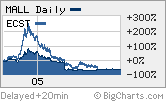 |
| Spinning out of control: Shares of PC Mall and its spin-off eCost.com shot up late last year but have plummeted in 2005. |
|
|
|
|
|
|
|
|
|
|
|
NEW YORK (CNN/Money) -
Down, dooby-do, down, down. Comma, comma down, dooby-do, down, down. Breaking up is hard to do.
These words of wisdom may be true for romantic entanglements. But for big-time corporations, Neil Sedaka could not be more wrong. It's looking quite easy to break up these days, especially in the world of tech, telecom and media.
Barry Diller's Web conglomerate IAC/InterActive (Research) spun off online travel company Expedia (Research) this summer. WebMD Health (Research) spilt into two firms -- one for its namesake health care information site and another for its medical billing and records company Emdeon (Research) -- in September.
An initial public offering of radio giant Clear Channel Communications' billboard division is tentatively set to start trading soon.
Viacom (Research), which reported third quarter earnings Tuesday morning, is set to split into two separate firms by year's end. And last week, hotel franchiser Cendant (Research) said it's splitting into four companies, including one for its own online travel business.
But wait! We're not done yet!
Also last week, magazine publisher Primedia (Research) said it was mulling a split in two: one company for its free consumer guides and one for the division that publishes "enthusiast" magazines like "Motor Trend" and "Hot Rod."
A spin-off of Sprint Nextel's local phone business is in the works for next year while fellow wireless firm Alltel is also considering a spin-off of its local business. And last but not least, Time Warner (Research), our parent company here at CNN/Money, is looking to sell a stake in its mammoth cable business to the public.
Whew!
The urge to demerge
Just a few years ago, big mergers were all the rage and "synergy" was the magic buzzword in corporate America and on Wall Street. So why are so many companies now rushing to get unhitched? And is this outbreak of corporate divorces good for shareholders?
Michael Mahoney, managing director of EGM Capital, a San Francisco-based hedge fund firm, said it's no secret why many larger tech, media and telecom firms are pursuing the breakup route: all three sectors have fared poorly.
So for companies trying to find ways to boost their stock price, companies can sell weak operations that have been a drag or break off strong divisions so they can get a higher multiple.
"A lot of these moves are dictated by the desires of the stock market, as in what divisions will the market pay a greater aggregate price for," said Mahoney.
In some cases, the strategy should work. Mahoney said the Sprint Nextel (Research) and Alltel (Research) local telephone spin-offs make a lot of sense since wireless is growing much more rapidly than traditional phone service.
"In telecom, competitive pressures have made the local landline business an expensive one to be in that doesn't give you any growth," Mahoney said,
Al Cardilli, an analyst with Spin-Off Advisors, an independent research firm based in Chicago, said Cendant is a perfect example of a company that clearly needed to break up since it was in so many different businesses. So a strong quarter in one piece of the business would easily get overshadowed. That should no longer be the case.
"Cendant went and made acquisitions in wide variety of industries," said Cardilli. "Once these companies are separate, individual management teams will be motivated because the fruits of their labor will show up and get directly factored into the price of their stock."
Negative spin
Of course, not all breakups are worth cheering.
Eric Newman, portfolio manager with TFS Capital, a West Chester, Pa.-based hedge fund, said companies sometimes should resist the temptation to break up since pleasing Wall Street in the short term is often not the right decision for the long term.
He pointed out the case of PC Mall (Research), a catalog and Internet retailer of computers and software. PC Mall sold a stake in its online closeout retailer eCost.com (Research) in August 2004 since investors thought that the pure play online company could get a better value on its own.
Shares of eCost.com and PC Mall surged last fall but after PC Mall spun off the rest of eCost.com this year, both stocks tanked.
eCost.com has struggled as an independent company, reporting sizable losses the past few quarters, and PC Mall has faced some challenges without eCost.com, reporting disappointing sales figures.
Newman thinks the company rushed into the spin-off. "Some companies bow to shareholder pressure," he said. "But catering to the whims of Wall Street may not always be in their best interest."
And Cardilli said investors should be wary of splits that are more cosmetic in nature -- ones where there is no major change in management structure, for example.
To that end, he said that the Viacom split and Clear Channel Outdoor IPO are the types of breakups that might not be that rewarding for shareholders.
In the case of Viacom, controlling shareholder and chairman Sumner Redstone will remain the majority owner and chairman of the new Viacom and its separate CBS unit. And Clear Channel Communications (Research) CEO Mark Mays will also be CEO of the Clear Channel Outdoor unit.
"This just enables a new piece of paper to trade separately," Cardilli said. "Ultimately these types of moves don't change the direction of business because the gray matter that's running the company is the same."
For more about the media sector's woes, click here.
For more market news, click here.
The reporter of this story owns shares of Time Warner through his company's 401(k) plan.

|